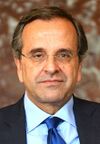List of political parties in Piraea
 |
|---|
| This article is part of a series on the politics and government of Piraea |
This is a comprehensive list of political parties in Piraea.
History
The political system of Piraea in the Third Republic is heavily based on proportial representation, which grants a multiparty system with a varied range of political parties being represented in the 125-seat Senate. During the period of the Second Republic, commonly referred to as the Government of National Reorganisation, the political system of the country was divided between outlawed political parties and organisations, mainly those in the left of the political spectrum, and those aligned with the military junta.
The fall of the military dictatorship and the first years of the Third Republic were marked by a rapid resurge of political parties, most of them under the forms they existed before the dictatorship. During the first years, the People's Party and the Piraese Socialist Workers Union became dominant in the political scenario, with the latter forming most governments until the mid-1990s. The PSEE, of socialist and anarcho-syndicalist roots has been, both a partner and rival inside the left side of the spectrum, of the Piraese Section of the Workers' International, heavily aligned with the Kirenia and the Association for International Socialism. The right, still dominated by the People's Party, has seen in recent years the emergence of the Democrats and the Homeland Party; while the former has centrist tendencies, the latter has been heavily categorised as populist and close to Etruria's Tribune Movement.
Piraea counts with a low threshold, which is responsible for the numerous political parties represented in the Senate and the impossibility for parties to achieve the needed seats to form a majority government.
Parties with representation in the Senate
| Party logo | Party name | Leader | Status | Seats in the Senate | Ideology | |
|---|---|---|---|---|---|---|
| Piraese Socialist Workers Union (PSEE) Πειραιηκή Σοσιαλιστών Εργαζομένων Ένωση |
36 / 125
|
Democratic socialism Progressivism Social democracy Secularism Pro-Eucleanism | ||||
| The PSEE is one of the oldest political parties in Piraea and has held a dominant position, together with the People's Party, over the politics of the country. It was founded during the first industrialisation period of Piraea and was conceived as a vehicle for trade union reclaims; since its inception, it has had close contacts with labour federations and has distinguished itself from the Piraese Section of the Workers' International by its anarcho-syndicalist roots and later social democratic stances. Through alliances with other left and centre-left parties, the PSEE has almost continuously led administrations during the 1980s and early 1990s. In Euclea, it is associated with the Socialist Alternative for Euclea. | ||||||
| People's Party (LK) Λαϊκό Κόμμα |
25 / 125
|
Liberal conservatism Economic liberalism Christian democracy | ||||
| Established shortly after the fall of the military junta as a coalition of liberal and centre-right political parties, the People's Party has alternately formed governments in Piraea and is the main opposition of the PSEE. Its position has changed inside the centre-right, with leaders like [name] during [time] that took the party farther right; Georgios Konstantinou, current leader, is a prominent figure from the moderate centre. During the mid-1990s, the party embraced neoliberal policies with the aim to reform the state and its institutions; over the years, prominent members of the party have been also members of the largest employers federation of Piraea. Since 2008, the party is an advocate for Euclean integration and is associated to the ACDE. | ||||||
| Democrats (DM) Δημοκρατικοί |
20 / 125
|
Economic liberalism Social liberalism Centrism Pro-Eucleanism | ||||
| Democrats is one of the youngest political parties in Piraea, it was founded in 2004 by members of the People's Party after the party was accused of having abandoned the political centre. Democrats have defined themselves as centrists and socially liberals, being in favour of numerous PSEE's political stances on social issues; however, the party recognises the need of a major state reform and is aligned with the People's Party in the use of neoliberal policies, fiscal incentives to businesses and employers and the urge to decrease inflation and maintain equilibrium. | ||||||
| Green Alternative (PEL) Πράσινη Εναλλακτική Λύση |
12 / 125
|
Progressivism Green politics Democratic socialism Pro-Eucleanism | ||||
| Founded during the 1980s by members of the PSEE and PTED after episodes of students' protests, the Green Alternative has grown in popularity over the years around urban centres and progressive former PSEE countryside bastions. Greens are close to the main centre-left party but have taken a critical position over most environmental issues, reclaiming more action from governments. It has been part of the executive twice, first between 2015 and 2017, and since the start of the current legislature in 2019. | ||||||
| Piraese Section of the Workers' International (PTED) Πειραικό Τμήμα της Εργατικής Διεθνούς |
10 / 125
|
Socialism Social democracy Democratic socialism Councilism | ||||
| The Piraese Section of the Workers' International is one of the oldest political parties in continuous functions in Piraea. It was founded in 1912 as a response to growing demands by the lower classes in industrial and agrarian sectors; the party rose power during the tumultuous First Republic and was banned from political and social activity by the military junta. During those years, members of the PTED were subject of arbitrary detentions and torture while performing in clandestine; the fall of the regime meant the return of a large exile and the party achieved the formation of several alliances with the PSEE to form be part of governments. | ||||||
| Change (AL) Αλλαγή |
6 / 125
|
Centrist politics Anti-corruption Third option Pro-Eucleanism | ||||
| Formed in response to the corruption charges presented against Evangelos Polakis' administrations that showed the clear connections between the mafia and the Piraese high politics. It is a centrist party, with a broad liberal platform defined as third option by most political observers, which has brought both criticism and praise due to its technocratic but professional approach to politics. AL has reused to form government with the two largest parties, KP and PSEE. | ||||||
| Humanist Centre (AK) Ανθρωπιστικό Κέντρο |
5 / 125
|
Centrist politics Pro-Eucleanism | ||||
| History | ||||||
| Independent Regionalist Union (APE) Ανεξάρτητη Περιφερειακή 'Ενωση |
4 / 125
|
Regionalism Pro-Eucleanism | ||||
| History | ||||||
| Homeland Party (PK) Πατριωτικό Κόμμα |
4 / 125
|
Religious conservatism Nationalism Eucloscepticism Right-wing populism | ||||
| A right-wing populist political party formed by former members of the far-right core of KP. It has been linked to numerous neo-functionalist groups and compared with Etruria's Tribune Movement; members of Homeland have also been denounced by other politicians for its aggressive manners, homophobic stances and exaltation of Human Right abuses during the dictatorship. The party advocates a return of conservative values, defends the position of the family in society and aims for a greater role of the Episemialist Church. | ||||||
| Novalian People's Party (NLK/NNS) Νοβαλικο λαϊκό κόμμα Novaliji narodna stranka |
3 / 125
|
Big-Tent Minority interests Novalian interests Populism | ||||
| The Novalian People's Party aims to protect Novalians' interests in Piraea, as well as their cultural heritage, language and contributions to Piraean society. It has been characterised for its big-tent platform and sometimes described as populist by observers; in general lines, it has been aligned with the centre-right in Piraea, and exposed numerous Christian democratic stances. | ||||||














